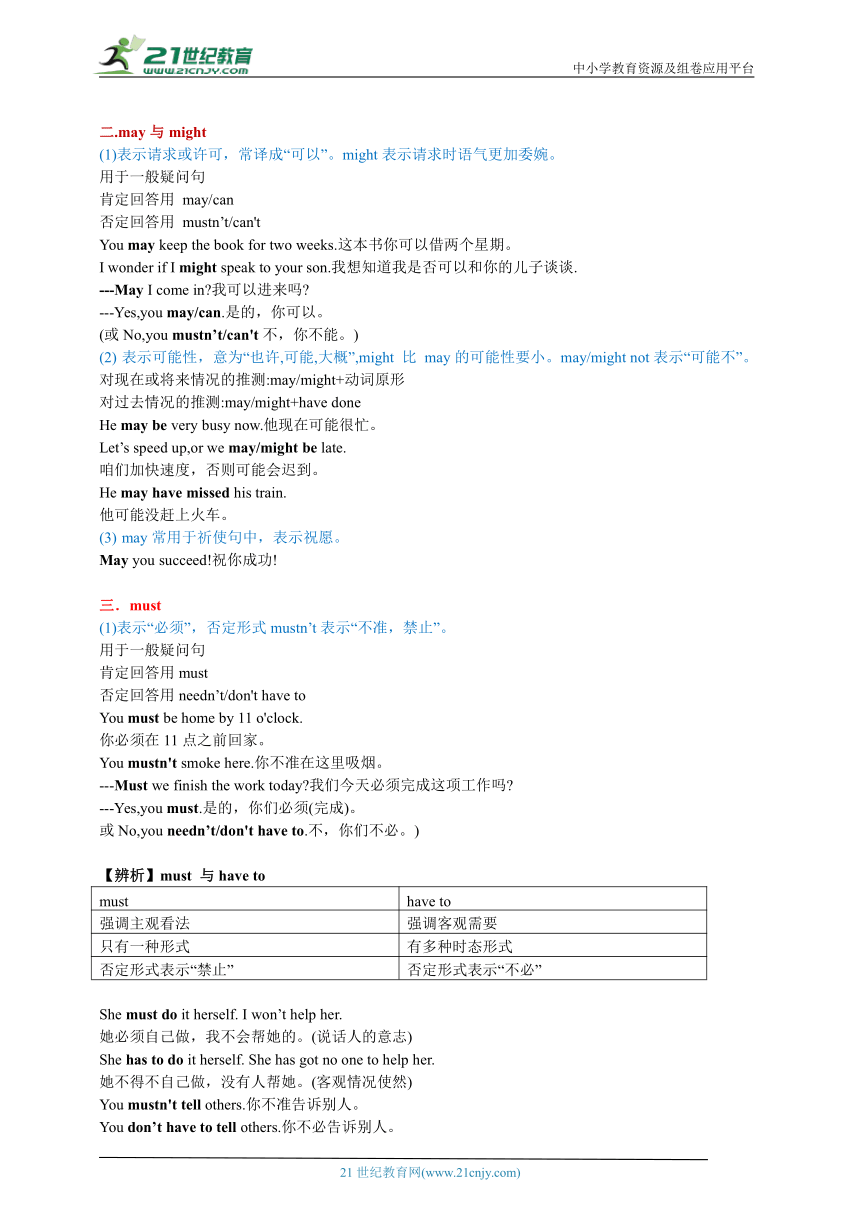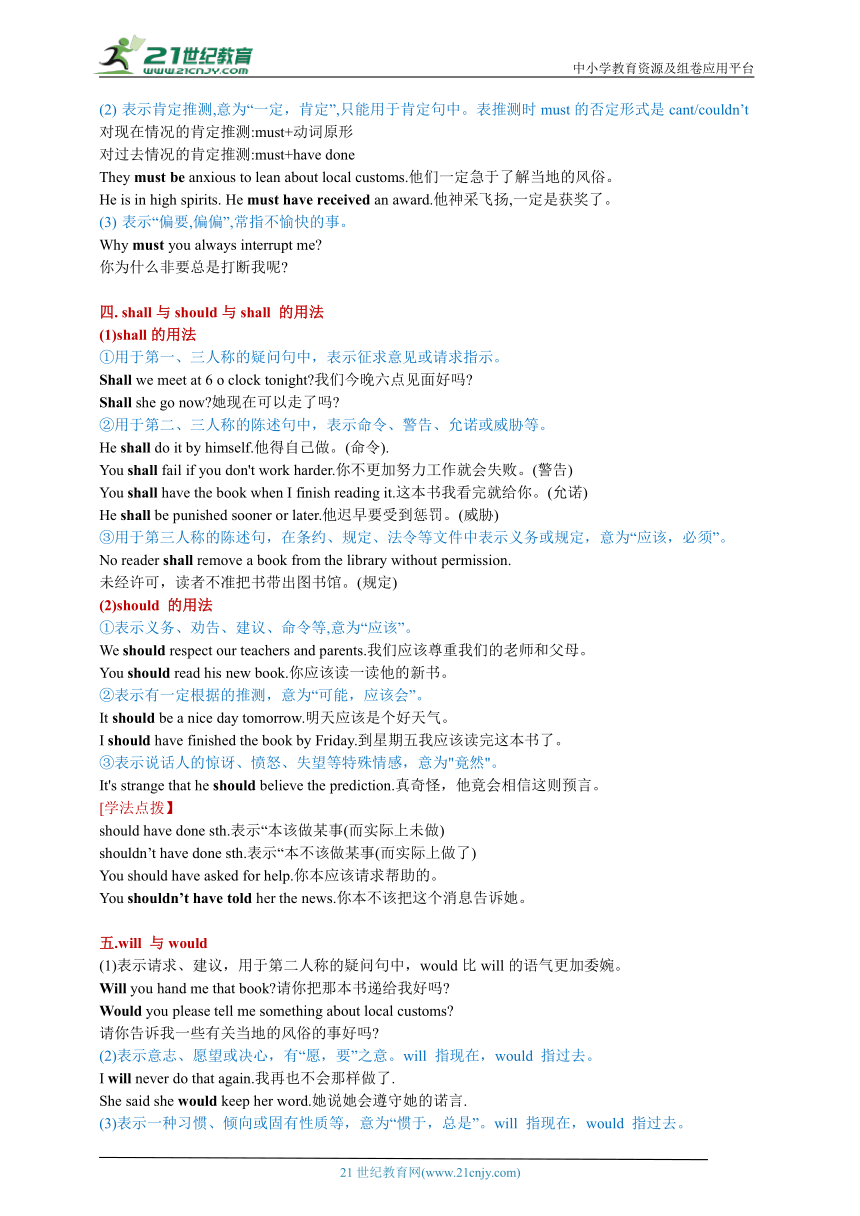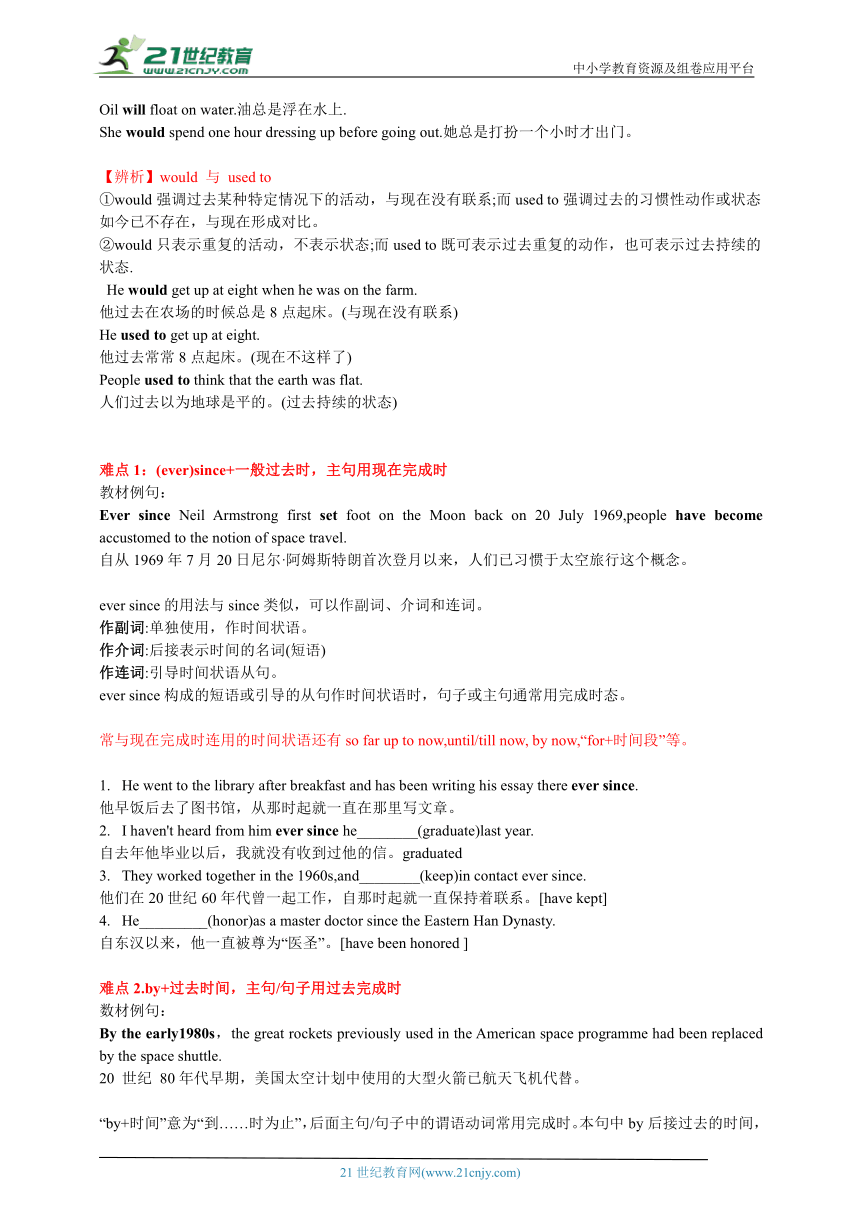(2019外研版)选修四 unit 6 讲义(精讲)
文档属性
| 名称 | (2019外研版)选修四 unit 6 讲义(精讲) |

|
|
| 格式 | doc | ||
| 文件大小 | 288.3KB | ||
| 资源类型 | 试卷 | ||
| 版本资源 | 外研版(2019) | ||
| 科目 | 英语 | ||
| 更新时间 | 2024-05-06 00:00:00 | ||
图片预览




文档简介
中小学教育资源及组卷应用平台
Unit 6
解透单元语法:复习情态动词
情态动词表示说话人的某种语气或情绪,如能力、可能、意愿、猜测、义务、需要等。
情态动词特征:有一定的词义,但不能单独作谓语,后面接动词原形;没有人称和数的变化(have to除外);有些情态动词有过去式,如:
Can-could,may-might,will-would, dare-dared. have to-had to 等。
一.can与could
(1)表示能力,常译为“能,会”。could 是 can 的过去式,表示过去的能力。
I can speak English, but I can’t speak Japanese.我会说英语,但是不会说日语。
She could play several instruments at the age of eight.她8岁时就会弹奏好几种乐器了。
(2)表示请求或许可,常译为“可以”。could 比 can 的语气更加委婉。
Can/Could I use your studio
我可以用一下你的工作室吗
----Of course you can.当然可以了。回答时不可用could
You can park the car over there.你可以把丰停在那里。
(3)表示可能性,常用于疑问句或否定句中,指“某事是不是事实”。用于肯定的陈述句中,表示理论上的可能性,意为“有时可能会”。
---Can/Could she be in the classroom 她可能在教室里吗
---No,she can’t/couldn’t.不,她不可能(在教室里)。
It can be quite cold at night here.这里夜间有时可能会很冷。
表示惊讶、不相信等,常用于否定句或疑问句中。
What can he be doing at this time of night 都到晚上这个时候了,他究竟在做什么
【归纳】
①can’t/couldn't have done sth.“不可能做了某事”,表示对过去的情况进行否定的推测。
I saw her just now. She can’t /couldn’t have gone to Beijing.
我刚才还看见她了,她不可能去北京了。
②could have done sth.既示对过去的推测,还可表示“过去本可以做某事(而实际上未做)”。 He could have already arrived in Beijing他可能已经到北京了。
He could have passed the exam, but he was too careless.他本可以通过考试,但是他太粗心了。
[辨析】can与be able to
①can只有现在式和过去式,而be able to 有更多的形式。
津华教育.秦老师:
Will you be able to come 你能来吗
I'm sorry I haven't been able to answer your letter in time.对不起,我没能及时给你回信。
②can一般指自身具有的能力,如果要表达将来的能力,一般要用be able to
The young man can’t carry the big box.
这个年轻人搬不动那个大箱子。
This time I failed the exam, but I'll be able to pass it next time.
这次我考试不及格,但下次我会及格的.
③be able to的过去式was/were able to可表示在过去设法做成了某事,相当于managed to do而could则无此意义。
The fire was very big,but most people were able to escape from it.
火很大,但大多数人从火中逃了出来。
二.may与might
(1)表示请求或许可,常译成“可以”。might表示请求时语气更加委婉。
用于一般疑问句
肯定回答用 may/can
否定回答用 mustn’t/can't
You may keep the book for two weeks.这本书你可以借两个星期。
I wonder if I might speak to your son.我想知道我是否可以和你的儿子谈谈.
---May I come in 我可以进来吗
---Yes,you may/can.是的,你可以。
(或No,you mustn’t/can't不,你不能。)
表示可能性,意为“也许,可能,大概”,might 比 may的可能性要小。may/might not表示“可能不”。
对现在或将来情况的推测:may/might+动词原形
对过去情况的推测:may/might+have done
He may be very busy now.他现在可能很忙。
Let’s speed up,or we may/might be late.
咱们加快速度,否则可能会迟到。
He may have missed his train.
他可能没赶上火车。
may常用于祈使句中,表示祝愿。
May you succeed!祝你成功!
三.must
(1)表示“必须”,否定形式mustn’t表示“不准,禁止”。
用于一般疑问句
肯定回答用must
否定回答用needn’t/don't have to
You must be home by 11 o'clock.
你必须在11点之前回家。
You mustn't smoke here.你不准在这里吸烟。
---Must we finish the work today 我们今天必须完成这项工作吗
---Yes,you must.是的,你们必须(完成)。
或No,you needn’t/don't have to.不,你们不必。)
【辨析】must 与have to
must have to
强调主观看法 强调客观需要
只有一种形式 有多种时态形式
否定形式表示“禁止” 否定形式表示“不必”
She must do it herself. I won’t help her.
她必须自己做,我不会帮她的。(说话人的意志)
She has to do it herself. She has got no one to help her.
她不得不自己做,没有人帮她。(客观情况使然)
You mustn't tell others.你不准告诉别人。
You don’t have to tell others.你不必告诉别人。
表示肯定推测,意为“一定,肯定”,只能用于肯定句中。表推测时must的否定形式是cant/couldn’t
对现在情况的肯定推测:must+动词原形
对过去情况的肯定推测:must+have done
They must be anxious to lean about local customs.他们一定急于了解当地的风俗。
He is in high spirits. He must have received an award.他神采飞扬,一定是获奖了。
表示“偏要,偏偏”,常指不愉快的事。
Why must you always interrupt me
你为什么非要总是打断我呢
shall与should与shall 的用法
(1)shall的用法
①用于第一、三人称的疑问句中,表示征求意见或请求指示。
Shall we meet at 6 o clock tonight 我们今晚六点见面好吗
Shall she go now 她现在可以走了吗
②用于第二、三人称的陈述句中,表示命令、警告、允诺或威胁等。
He shall do it by himself.他得自己做。(命令).
You shall fail if you don't work harder.你不更加努力工作就会失败。(警告)
You shall have the book when I finish reading it.这本书我看完就给你。(允诺)
He shall be punished sooner or later.他迟早要受到惩罚。(威胁)
③用于第三人称的陈述句,在条约、规定、法令等文件中表示义务或规定,意为“应该,必须”。
No reader shall remove a book from the library without permission.
未经许可,读者不准把书带出图书馆。(规定)
(2)should 的用法
①表示义务、劝告、建议、命令等,意为“应该”。
We should respect our teachers and parents.我们应该尊重我们的老师和父母。
You should read his new book.你应该读一读他的新书。
②表示有一定根据的推测,意为“可能,应该会”。
It should be a nice day tomorrow.明天应该是个好天气。
I should have finished the book by Friday.到星期五我应该读完这本书了。
③表示说话人的惊讶、愤怒、失望等特殊情感,意为"竟然"。
It's strange that he should believe the prediction.真奇怪,他竟会相信这则预言。
[学法点拨】
should have done sth.表示“本该做某事(而实际上未做)
shouldn’t have done sth.表示“本不该做某事(而实际上做了)
You should have asked for help.你本应该请求帮助的。
You shouldn’t have told her the news.你本不该把这个消息告诉她。
五.will 与would
(1)表示请求、建议,用于第二人称的疑问句中,would比will的语气更加委婉。
Will you hand me that book 请你把那本书递给我好吗
Would you please tell me something about local customs
请你告诉我一些有关当地的风俗的事好吗
(2)表示意志、愿望或决心,有“愿,要”之意。will 指现在,would 指过去。
I will never do that again.我再也不会那样做了.
She said she would keep her word.她说她会遵守她的诺言.
(3)表示一种习惯、倾向或固有性质等,意为“惯于,总是”。will 指现在,would 指过去。
Oil will float on water.油总是浮在水上.
She would spend one hour dressing up before going out.她总是打扮一个小时才出门。
【辨析】would 与 used to
①would强调过去某种特定情况下的活动,与现在没有联系;而used to强调过去的习惯性动作或状态如今已不存在,与现在形成对比。
②would只表示重复的活动,不表示状态;而used to既可表示过去重复的动作,也可表示过去持续的状态.
He would get up at eight when he was on the farm.
他过去在农场的时候总是8点起床。(与现在没有联系)
He used to get up at eight.
他过去常常8点起床。(现在不这样了)
People used to think that the earth was flat.
人们过去以为地球是平的。(过去持续的状态)
难点1:(ever)since+一般过去时,主句用现在完成时
教材例句:
Ever since Neil Armstrong first set foot on the Moon back on 20 July 1969,people have become accustomed to the notion of space travel.
自从1969年7月20日尼尔·阿姆斯特朗首次登月以来,人们已习惯于太空旅行这个概念。
ever since的用法与since类似,可以作副词、介词和连词。
作副词:单独使用,作时间状语。
作介词:后接表示时间的名词(短语)
作连词:引导时间状语从句。
ever since构成的短语或引导的从句作时间状语时,句子或主句通常用完成时态。
常与现在完成时连用的时间状语还有so far up to now,until/till now, by now,“for+时间段”等。
He went to the library after breakfast and has been writing his essay there ever since.
他早饭后去了图书馆,从那时起就一直在那里写文章。
I haven't heard from him ever since he________(graduate)last year.
自去年他毕业以后,我就没有收到过他的信。graduated
They worked together in the 1960s,and________(keep)in contact ever since.
他们在20世纪60年代曾一起工作,自那时起就一直保持着联系。[have kept]
He_________(honor)as a master doctor since the Eastern Han Dynasty.
自东汉以来,他一直被尊为“医圣”。[have been honored ]
难点2.by+过去时间,主句/句子用过去完成时
数材例句:
By the early1980s,the great rockets previously used in the American space programme had been replaced by the space shuttle.
20 世纪 80年代早期,美国太空计划中使用的大型火箭已航天飞机代替。
“by+时间”意为“到……时为止”,后面主句/句子中的谓语动词常用完成时。本句中by后接过去的时间,谓语动词用的是过去完成时;若其后接现在的时间,谓语动词用现在完成时;若其后接将来的时间,谓语动词用将来完成时。
By last term, we had finished all the lessons.
到上学期为止,我们已经完成了所有的功课。
By now,he has answered nine questions.
到目前为止,他已经回答了九个问题。
By next year, the bridge will have been completed.
到明年,大桥将已经完工。
1.By the time Dale was a senior, he had won every top honor in speech.
戴尔大四时,他已经赢得了演讲方面的每一项最高荣誉。
By the end of last year,I had had several new friends,and two of them are still my best friends today.
到去年年底,我有了几个新朋友,其中两个至今仍是我最好的朋友。
3.Hopefully in 2025 we will no longer be e-mailing each other, for we_________
(develop) more convenient electronic communication tools by then.
到2025年,我们有望不再互相发电子邮件,因为届时我们将开发出更方便的电子通信工具。[ will have developed]
难点3:虚拟条件句(对过去的虚拟)
教材例句:
Christa would have inspired lots of people if she hadn't lost her life on board the Challenger.
如果克丽斯塔没有在“挑战者”号上失去生命,她会激励很多人。
与过去事实相反的虚拟条件句:
表示与过去事实相反的情况或对过去情况的一种假设。条件从句的谓语用had done的形式,主句的谓语形式为“would/ should/could/might+have done”。
if虚拟条件句表示对现在的虚拟时,从句谓语动词用过去式(be动词常用were),主句谓语用“would/should/ could/might +do”。
表示对将来的虚拟时,从句谓语用“should do/were to do/过去式(be动词常用were)”,主句谓语用“would/ should/could/might+do”。
1.I was wearing a seat belt. If I hadn’t been wearing one, I would have been injured.
我当时系着安全带。如果没系的话,我会受伤的。
2.“If I knew the answers to all your questions, I'd be a genius,"he said.“
我如果知道你所有问题的答案,就是天才了,"他说道。
3.If I were__________(bring)my clay here and work for three hours every afternoon,I could complete most of the project while you are at your desk.
如果我把我的黏土带到这里,每天下午工作三个小时,我可以在你坐在办公的时候完成大部分的工作。[to bring ]
难点4:“so+ adj./adv.”置于句首的部分倒装(含so... that)
教材例句
So great was the distance from Earth that it would need to travel for almost six years to reach its destination.
(土星)离地球的距离是如此遥远,以至于它需要飞行将近六年才能到达目的地。
so/such..that..结构中,so/such….置于句首时,该句用部分倒装,that从句不倒装。
So cold is it that you can’t go outside.
So well have the kids done that they deserve our praise and thanks.
Such a difficult problem is it that I find it hard to solve.
so...that/so that
so..that 只引导结果状语从句;
so that既可以引导结果状语从句,又可以引导目的状语从句。
1 So frightened was she in the darkness that she didn’t dare to move.
她在黑暗中害怕得不敢动。
2.So sudden was the attack that we had no time to escape.
袭击来得非常突然,以至于我们来不及逃跑。
3.So cold was the weather that we had to stay at home.
天气太冷了,我们只好待在家里。
3.The building is splendid that the people living there all think highly of it.
那栋建筑物如此壮观,住在那里的人都对它评价很高。[so ]
难点5:独立主格结构
教材例句:
The planets were seen to be worlds similar to our own,many of them even having their own moons.
每个疗星都可以被视为和我们地球类型的星球,其中许多行星甚至有它们自己的卫星。
独立主格结构:
(1)构成:名词/代词+分词/不定式/形容词/副词/介词短语。
(2)作用:在句中作状语,表示时间,原因、条件、方式、伴随等。
分词作状语、独立主格结构和with 复合结构三者的区别
①分词作状语:分词的逻辑主语是句子的主语
②独立主格结构:独立主格结构有自己的逻辑主语
③with 复合结构:在独立主格结构前加 with 构成
1.And this is why diversity in science--the more people looking at a claim from different angles----is important.
这就是为什么科学的多样性--更多的人从不同的角度看待一项主张--是重要的。
2.The work done ( After the work had been done),we went home.
工作完成后,我们就回家了。
3.China's image is improving steadily,with more countries_______(recognize)its role in international affairs.
中国的形象正在稳步提升,更多的国家认识到中国在国际事务中的作用。
本单元词组:
1.become accustomed to 习惯于(做)某事 2.take off 起飞;突然大受欢迎;脱下
3.cast a shadow on 给...蒙上阴影 4.reach for the stars探索星空;有九天揽月之志,努力完成壮举
5.quest for 追求;探索;设法找到 6.one’s heart in one’s mouth 提心吊胆;心提到了嗓子眼
7.tune in 收看;收听 8.call to 呼唤;向...喊
9.be composed of 由...构成/组成 10.be replaced by 被...取代
11.have patience doing sth.有耐心做某事 12.call (out) to sb. (for) sth.向某人大声呼叫;向某人大声说(以引起注意)
13.be determined to do sth.下定决心做某事 14.set foot on踏上
15.call off取消;依次叫名 16.reach for伸手去拿
17.collide with和...相撞;冲突 18.make contact with接触;与...联系
19.bring...back to one’s attention使...重新引起某人的注意 20.have the chance to do sth.有机会做某事
21.sign up for 登记注册;报名(参加课程) 22.be likely to很有可能;倾向于
23.be founded in建立在 24.take part in参与;参加
25.at a (an)...speed以...速度 26.be engaged in 忙于;从事于;参与
27.in (the)search for 寻求;寻找 28.be close to 接近;靠近;与...关系亲密
29.beyond one’s imagination超乎某人的想象 30.carry out 执行;实施
31.be regarded as被认为是;被当做是 32.look back on回顾;回忆
33.focus on集中于
21世纪教育网 www.21cnjy.com 精品试卷·第 2 页 (共 2 页)
21世纪教育网(www.21cnjy.com)
Unit 6
解透单元语法:复习情态动词
情态动词表示说话人的某种语气或情绪,如能力、可能、意愿、猜测、义务、需要等。
情态动词特征:有一定的词义,但不能单独作谓语,后面接动词原形;没有人称和数的变化(have to除外);有些情态动词有过去式,如:
Can-could,may-might,will-would, dare-dared. have to-had to 等。
一.can与could
(1)表示能力,常译为“能,会”。could 是 can 的过去式,表示过去的能力。
I can speak English, but I can’t speak Japanese.我会说英语,但是不会说日语。
She could play several instruments at the age of eight.她8岁时就会弹奏好几种乐器了。
(2)表示请求或许可,常译为“可以”。could 比 can 的语气更加委婉。
Can/Could I use your studio
我可以用一下你的工作室吗
----Of course you can.当然可以了。回答时不可用could
You can park the car over there.你可以把丰停在那里。
(3)表示可能性,常用于疑问句或否定句中,指“某事是不是事实”。用于肯定的陈述句中,表示理论上的可能性,意为“有时可能会”。
---Can/Could she be in the classroom 她可能在教室里吗
---No,she can’t/couldn’t.不,她不可能(在教室里)。
It can be quite cold at night here.这里夜间有时可能会很冷。
表示惊讶、不相信等,常用于否定句或疑问句中。
What can he be doing at this time of night 都到晚上这个时候了,他究竟在做什么
【归纳】
①can’t/couldn't have done sth.“不可能做了某事”,表示对过去的情况进行否定的推测。
I saw her just now. She can’t /couldn’t have gone to Beijing.
我刚才还看见她了,她不可能去北京了。
②could have done sth.既示对过去的推测,还可表示“过去本可以做某事(而实际上未做)”。 He could have already arrived in Beijing他可能已经到北京了。
He could have passed the exam, but he was too careless.他本可以通过考试,但是他太粗心了。
[辨析】can与be able to
①can只有现在式和过去式,而be able to 有更多的形式。
津华教育.秦老师:
Will you be able to come 你能来吗
I'm sorry I haven't been able to answer your letter in time.对不起,我没能及时给你回信。
②can一般指自身具有的能力,如果要表达将来的能力,一般要用be able to
The young man can’t carry the big box.
这个年轻人搬不动那个大箱子。
This time I failed the exam, but I'll be able to pass it next time.
这次我考试不及格,但下次我会及格的.
③be able to的过去式was/were able to可表示在过去设法做成了某事,相当于managed to do而could则无此意义。
The fire was very big,but most people were able to escape from it.
火很大,但大多数人从火中逃了出来。
二.may与might
(1)表示请求或许可,常译成“可以”。might表示请求时语气更加委婉。
用于一般疑问句
肯定回答用 may/can
否定回答用 mustn’t/can't
You may keep the book for two weeks.这本书你可以借两个星期。
I wonder if I might speak to your son.我想知道我是否可以和你的儿子谈谈.
---May I come in 我可以进来吗
---Yes,you may/can.是的,你可以。
(或No,you mustn’t/can't不,你不能。)
表示可能性,意为“也许,可能,大概”,might 比 may的可能性要小。may/might not表示“可能不”。
对现在或将来情况的推测:may/might+动词原形
对过去情况的推测:may/might+have done
He may be very busy now.他现在可能很忙。
Let’s speed up,or we may/might be late.
咱们加快速度,否则可能会迟到。
He may have missed his train.
他可能没赶上火车。
may常用于祈使句中,表示祝愿。
May you succeed!祝你成功!
三.must
(1)表示“必须”,否定形式mustn’t表示“不准,禁止”。
用于一般疑问句
肯定回答用must
否定回答用needn’t/don't have to
You must be home by 11 o'clock.
你必须在11点之前回家。
You mustn't smoke here.你不准在这里吸烟。
---Must we finish the work today 我们今天必须完成这项工作吗
---Yes,you must.是的,你们必须(完成)。
或No,you needn’t/don't have to.不,你们不必。)
【辨析】must 与have to
must have to
强调主观看法 强调客观需要
只有一种形式 有多种时态形式
否定形式表示“禁止” 否定形式表示“不必”
She must do it herself. I won’t help her.
她必须自己做,我不会帮她的。(说话人的意志)
She has to do it herself. She has got no one to help her.
她不得不自己做,没有人帮她。(客观情况使然)
You mustn't tell others.你不准告诉别人。
You don’t have to tell others.你不必告诉别人。
表示肯定推测,意为“一定,肯定”,只能用于肯定句中。表推测时must的否定形式是cant/couldn’t
对现在情况的肯定推测:must+动词原形
对过去情况的肯定推测:must+have done
They must be anxious to lean about local customs.他们一定急于了解当地的风俗。
He is in high spirits. He must have received an award.他神采飞扬,一定是获奖了。
表示“偏要,偏偏”,常指不愉快的事。
Why must you always interrupt me
你为什么非要总是打断我呢
shall与should与shall 的用法
(1)shall的用法
①用于第一、三人称的疑问句中,表示征求意见或请求指示。
Shall we meet at 6 o clock tonight 我们今晚六点见面好吗
Shall she go now 她现在可以走了吗
②用于第二、三人称的陈述句中,表示命令、警告、允诺或威胁等。
He shall do it by himself.他得自己做。(命令).
You shall fail if you don't work harder.你不更加努力工作就会失败。(警告)
You shall have the book when I finish reading it.这本书我看完就给你。(允诺)
He shall be punished sooner or later.他迟早要受到惩罚。(威胁)
③用于第三人称的陈述句,在条约、规定、法令等文件中表示义务或规定,意为“应该,必须”。
No reader shall remove a book from the library without permission.
未经许可,读者不准把书带出图书馆。(规定)
(2)should 的用法
①表示义务、劝告、建议、命令等,意为“应该”。
We should respect our teachers and parents.我们应该尊重我们的老师和父母。
You should read his new book.你应该读一读他的新书。
②表示有一定根据的推测,意为“可能,应该会”。
It should be a nice day tomorrow.明天应该是个好天气。
I should have finished the book by Friday.到星期五我应该读完这本书了。
③表示说话人的惊讶、愤怒、失望等特殊情感,意为"竟然"。
It's strange that he should believe the prediction.真奇怪,他竟会相信这则预言。
[学法点拨】
should have done sth.表示“本该做某事(而实际上未做)
shouldn’t have done sth.表示“本不该做某事(而实际上做了)
You should have asked for help.你本应该请求帮助的。
You shouldn’t have told her the news.你本不该把这个消息告诉她。
五.will 与would
(1)表示请求、建议,用于第二人称的疑问句中,would比will的语气更加委婉。
Will you hand me that book 请你把那本书递给我好吗
Would you please tell me something about local customs
请你告诉我一些有关当地的风俗的事好吗
(2)表示意志、愿望或决心,有“愿,要”之意。will 指现在,would 指过去。
I will never do that again.我再也不会那样做了.
She said she would keep her word.她说她会遵守她的诺言.
(3)表示一种习惯、倾向或固有性质等,意为“惯于,总是”。will 指现在,would 指过去。
Oil will float on water.油总是浮在水上.
She would spend one hour dressing up before going out.她总是打扮一个小时才出门。
【辨析】would 与 used to
①would强调过去某种特定情况下的活动,与现在没有联系;而used to强调过去的习惯性动作或状态如今已不存在,与现在形成对比。
②would只表示重复的活动,不表示状态;而used to既可表示过去重复的动作,也可表示过去持续的状态.
He would get up at eight when he was on the farm.
他过去在农场的时候总是8点起床。(与现在没有联系)
He used to get up at eight.
他过去常常8点起床。(现在不这样了)
People used to think that the earth was flat.
人们过去以为地球是平的。(过去持续的状态)
难点1:(ever)since+一般过去时,主句用现在完成时
教材例句:
Ever since Neil Armstrong first set foot on the Moon back on 20 July 1969,people have become accustomed to the notion of space travel.
自从1969年7月20日尼尔·阿姆斯特朗首次登月以来,人们已习惯于太空旅行这个概念。
ever since的用法与since类似,可以作副词、介词和连词。
作副词:单独使用,作时间状语。
作介词:后接表示时间的名词(短语)
作连词:引导时间状语从句。
ever since构成的短语或引导的从句作时间状语时,句子或主句通常用完成时态。
常与现在完成时连用的时间状语还有so far up to now,until/till now, by now,“for+时间段”等。
He went to the library after breakfast and has been writing his essay there ever since.
他早饭后去了图书馆,从那时起就一直在那里写文章。
I haven't heard from him ever since he________(graduate)last year.
自去年他毕业以后,我就没有收到过他的信。graduated
They worked together in the 1960s,and________(keep)in contact ever since.
他们在20世纪60年代曾一起工作,自那时起就一直保持着联系。[have kept]
He_________(honor)as a master doctor since the Eastern Han Dynasty.
自东汉以来,他一直被尊为“医圣”。[have been honored ]
难点2.by+过去时间,主句/句子用过去完成时
数材例句:
By the early1980s,the great rockets previously used in the American space programme had been replaced by the space shuttle.
20 世纪 80年代早期,美国太空计划中使用的大型火箭已航天飞机代替。
“by+时间”意为“到……时为止”,后面主句/句子中的谓语动词常用完成时。本句中by后接过去的时间,谓语动词用的是过去完成时;若其后接现在的时间,谓语动词用现在完成时;若其后接将来的时间,谓语动词用将来完成时。
By last term, we had finished all the lessons.
到上学期为止,我们已经完成了所有的功课。
By now,he has answered nine questions.
到目前为止,他已经回答了九个问题。
By next year, the bridge will have been completed.
到明年,大桥将已经完工。
1.By the time Dale was a senior, he had won every top honor in speech.
戴尔大四时,他已经赢得了演讲方面的每一项最高荣誉。
By the end of last year,I had had several new friends,and two of them are still my best friends today.
到去年年底,我有了几个新朋友,其中两个至今仍是我最好的朋友。
3.Hopefully in 2025 we will no longer be e-mailing each other, for we_________
(develop) more convenient electronic communication tools by then.
到2025年,我们有望不再互相发电子邮件,因为届时我们将开发出更方便的电子通信工具。[ will have developed]
难点3:虚拟条件句(对过去的虚拟)
教材例句:
Christa would have inspired lots of people if she hadn't lost her life on board the Challenger.
如果克丽斯塔没有在“挑战者”号上失去生命,她会激励很多人。
与过去事实相反的虚拟条件句:
表示与过去事实相反的情况或对过去情况的一种假设。条件从句的谓语用had done的形式,主句的谓语形式为“would/ should/could/might+have done”。
if虚拟条件句表示对现在的虚拟时,从句谓语动词用过去式(be动词常用were),主句谓语用“would/should/ could/might +do”。
表示对将来的虚拟时,从句谓语用“should do/were to do/过去式(be动词常用were)”,主句谓语用“would/ should/could/might+do”。
1.I was wearing a seat belt. If I hadn’t been wearing one, I would have been injured.
我当时系着安全带。如果没系的话,我会受伤的。
2.“If I knew the answers to all your questions, I'd be a genius,"he said.“
我如果知道你所有问题的答案,就是天才了,"他说道。
3.If I were__________(bring)my clay here and work for three hours every afternoon,I could complete most of the project while you are at your desk.
如果我把我的黏土带到这里,每天下午工作三个小时,我可以在你坐在办公的时候完成大部分的工作。[to bring ]
难点4:“so+ adj./adv.”置于句首的部分倒装(含so... that)
教材例句
So great was the distance from Earth that it would need to travel for almost six years to reach its destination.
(土星)离地球的距离是如此遥远,以至于它需要飞行将近六年才能到达目的地。
so/such..that..结构中,so/such….置于句首时,该句用部分倒装,that从句不倒装。
So cold is it that you can’t go outside.
So well have the kids done that they deserve our praise and thanks.
Such a difficult problem is it that I find it hard to solve.
so...that/so that
so..that 只引导结果状语从句;
so that既可以引导结果状语从句,又可以引导目的状语从句。
1 So frightened was she in the darkness that she didn’t dare to move.
她在黑暗中害怕得不敢动。
2.So sudden was the attack that we had no time to escape.
袭击来得非常突然,以至于我们来不及逃跑。
3.So cold was the weather that we had to stay at home.
天气太冷了,我们只好待在家里。
3.The building is splendid that the people living there all think highly of it.
那栋建筑物如此壮观,住在那里的人都对它评价很高。[so ]
难点5:独立主格结构
教材例句:
The planets were seen to be worlds similar to our own,many of them even having their own moons.
每个疗星都可以被视为和我们地球类型的星球,其中许多行星甚至有它们自己的卫星。
独立主格结构:
(1)构成:名词/代词+分词/不定式/形容词/副词/介词短语。
(2)作用:在句中作状语,表示时间,原因、条件、方式、伴随等。
分词作状语、独立主格结构和with 复合结构三者的区别
①分词作状语:分词的逻辑主语是句子的主语
②独立主格结构:独立主格结构有自己的逻辑主语
③with 复合结构:在独立主格结构前加 with 构成
1.And this is why diversity in science--the more people looking at a claim from different angles----is important.
这就是为什么科学的多样性--更多的人从不同的角度看待一项主张--是重要的。
2.The work done ( After the work had been done),we went home.
工作完成后,我们就回家了。
3.China's image is improving steadily,with more countries_______(recognize)its role in international affairs.
中国的形象正在稳步提升,更多的国家认识到中国在国际事务中的作用。
本单元词组:
1.become accustomed to 习惯于(做)某事 2.take off 起飞;突然大受欢迎;脱下
3.cast a shadow on 给...蒙上阴影 4.reach for the stars探索星空;有九天揽月之志,努力完成壮举
5.quest for 追求;探索;设法找到 6.one’s heart in one’s mouth 提心吊胆;心提到了嗓子眼
7.tune in 收看;收听 8.call to 呼唤;向...喊
9.be composed of 由...构成/组成 10.be replaced by 被...取代
11.have patience doing sth.有耐心做某事 12.call (out) to sb. (for) sth.向某人大声呼叫;向某人大声说(以引起注意)
13.be determined to do sth.下定决心做某事 14.set foot on踏上
15.call off取消;依次叫名 16.reach for伸手去拿
17.collide with和...相撞;冲突 18.make contact with接触;与...联系
19.bring...back to one’s attention使...重新引起某人的注意 20.have the chance to do sth.有机会做某事
21.sign up for 登记注册;报名(参加课程) 22.be likely to很有可能;倾向于
23.be founded in建立在 24.take part in参与;参加
25.at a (an)...speed以...速度 26.be engaged in 忙于;从事于;参与
27.in (the)search for 寻求;寻找 28.be close to 接近;靠近;与...关系亲密
29.beyond one’s imagination超乎某人的想象 30.carry out 执行;实施
31.be regarded as被认为是;被当做是 32.look back on回顾;回忆
33.focus on集中于
21世纪教育网 www.21cnjy.com 精品试卷·第 2 页 (共 2 页)
21世纪教育网(www.21cnjy.com)
